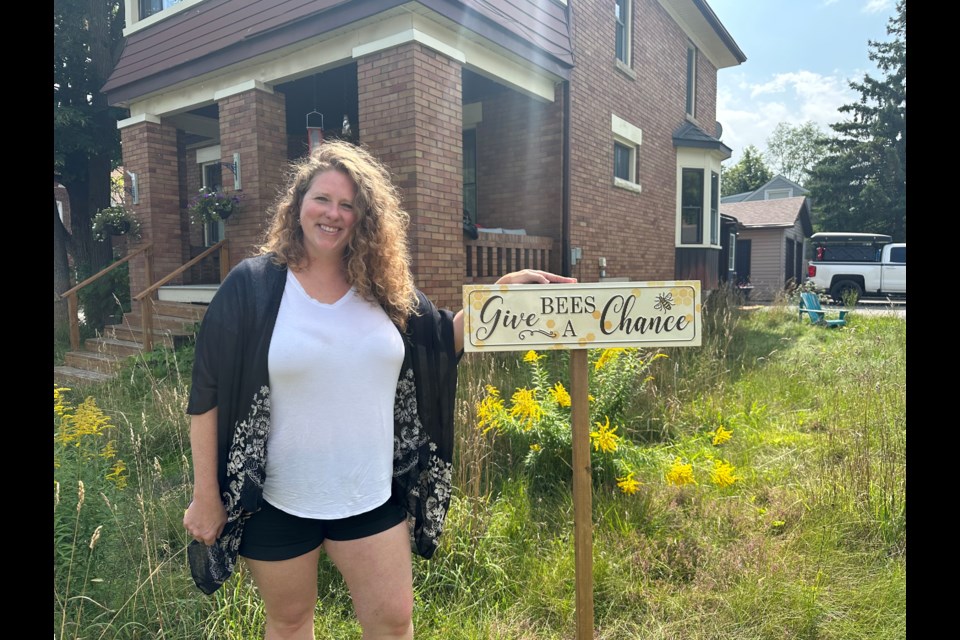A local woman is frustrated with a city bylaw that prohibits her from maintaining her yard as a site for bees and other pollinators.
For the past couple years, Stacie Theis has let natural vegetation grow unimpeded on her West Street North property, and her yard now boasts an estimated 20 species of native plants, which in turn bring a wide variety of insects, bees, and even rabbits to her yard.
However, under Chapter 834 of the city’s municipal code, citizens are required to keep their yards clean and clear of waste, such as unlicensed vehicles, household or industrial waste, and grass or weeds taller than eight inches.
With many of her plants exceeding that limit – such as the three-foot-tall goldenrod flowers in the middle of her yard – Theis was recently served a letter from the city demanding she cut her lawn prior to Aug. 24.
If she does not comply, Theis could be charged with a $100 re-inspection fee, charges pursuant to the Provincial Offences Act, and the city has the authority to cut her lawn at her expense.
“My lawn is not unkempt. I pick up the garbage. There's no trash, there's no garbage. There's no unwanted vehicles,” she said. “Classing goldenrod on the same level that you would put industrial waste – like are you joking me?”
Theis argues the bylaw directly opposes Orillia’s commitment to fostering pollinator habitats through its ‘Bee City’ designation, and only serves to reduce biodiversity throughout the city.
“The bylaw is so outdated and is not reflective of the current state of our world and what we're going to be facing, but also we're a Bee City,” she told OrilliaMatters. “I don't understand why the city is gonna waste their time … to cut down something that is functional and part of nature.”
She expressed frustration with vegetation exceeding eight inches on numerous city properties, including plants like the invasive tiger lily, among other non-native species, and she argued Chapter 834 enforces a murky, subjective view of what a weed is.
“A weed, by definition, is an undesirable or unwanted plant. It doesn't mean anything,” she said. “Their bylaw needs to be objective.”
There’s a hypocrisy in promoting monoculture lawns and non-native plants, Theis argued.
“I don't understand the hypocrisy in allowing my neighbours to plant tiger lilies on their boulevard, and then I allow my lawn to be natural and people are complaining,” she said.
Theis said she does not need to use a sprinkler or any pesticides to maintain her lawn, which is not the case for other lawns around the city, which she argues run counter to the city's stated objectives to mitigate climate change and foster pollinator habitats.
“My lawn doesn't hurt anyone. It's based on evidence. It provides habitat. I’m reducing my personal carbon footprint, my impact on water consumption,” she said. “I'm not adding to nitrogen runoff in the water, which causes algae blooms.
“If you want to talk about climate change, pulling water out of the ground and out of our ecosystem that we all need to survive … and then watering non-native plants to keep my short grass happy – I just don't get it,” she said.
With many native flowers and plants exceeding eight inches in height, Theis argues the bylaw should be altered to permit vegetation up to a metre.
“The current height rule of eight inches falls short of the height of the 12 to 36 inches for many indigenous pollinator plants and is not based on scientific evidence,” she said in a recent letter to the city. “The bylaw needs to be amended to a height restriction of at least one metre to encourage the growth of indigenous plants and support Orillia’s Bee City status.”
Theis said she has no plans to cut her lawn by the city’s Aug. 24 deadline.
Just as she pushes to protect her lawn as a pollinator habitat, however, the city is moving to crack down on Chapter 834 infractions.
At Monday’s council meeting, Coun. Janet-Lynne Durnford proposed a pilot project that would see bylaw enforcement take a more proactive approach in addressing “chronic problem properties” under the chapter throughout the city.
Though the pilot project is subject to a further report by city staff prior to implementation, Durnford gained council’s support for the idea.
At the meeting, Durnford spoke of Chapter 834 issues unrelated to weeds or grass – though they still fall under the legislation.
"By chronic problem property, we (mean) properties that ... have garbage that accumulates outside causing health hazards, rodent infestations. needles on the property and around the property, those kinds of concerns," Durnford said on Monday.
Currently, Chapter 834 is enforced on a reactive basis, where residents need to file numerous complaints to see enforcement, Durnford noted Monday, while the pilot project would see bylaw enforcement step in after three complaints over a two-year period.
